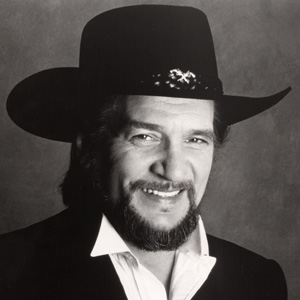Buddy Holly's bandmate. Moody Nashville Sound crooner. Telecaster-wielding
Outlaw. Blood brother of Willie, Johnny and Kris. In his 40-year career, Waylon
Jennings played a lot of roles, but there was always the sense that he was
searching for something he couldn't find.
The wanderlust began early. Born into a dirt-poor family of cotton farmers in
west Texas, young Waylon escaped as soon as he could, quitting school to hit
the road. First as a DJ, then a guitar-playing sideman, Jennings chased the
muse through bars and honky tonks, over years of one-night stands. One of his
earliest gigs, touring with Buddy Holly, ended in tragedy when Jennings gave up
his seat to J. P. "Big Bopper" Richardson on the plane that crashed in an Iowa
cornfield. The incident added a psychic scar to Jennings' music that would give
even his most celebratory songs a haunted, melancholy undertow. But the time
with Holly also inspired an attitude that Jennings embraced. "Buddy taught me
that music shouldn't have any barriers to it," he said.
Landing in Nashville in the mid-'60s, Jennings roomed with Johnny Cash, and for
five years churned out Nashville Sound-style hits and won a Grammy, even as he
chafed under the pop smoothness of it all. In the early '70s, he took a stand
against Music Row, and along with his wife Jessi Colter and fellow renegades
Willie Nelson, Tompall Glaser and Billy Joe Shaver, started what became known
as the Outlaw Movement. Rowdy, reckless and romantic, the lean sound pared away
all the sweeteners, and for Waylon, let his burnt-at-the-edges baritone shine.
It brought out some of his best songs too. Songs that tackled the changing
trends in country ("Are You Sure Hank Done It This Way"), the desperado
mentality ("I've Always Been Crazy") and the thin line between image and
reality ("Don't You Think This Outlaw Bit's Done Got Out of Hand")
As Waylon's platinum-selling popularity skyrocketed through the '70s, his
excessive lifestyle and substance abuse caught up with him. When he eventually
got clean, he went back to attain his high school equivalency diploma, and
became a spokesman for the importance of staying in school.
In 2001, Waylon was inducted into the Country Music Hall of Fame (in typical
rebel fashion, he didn't attend the ceremony). He died in 2002 of complications
from diabetes. His son Shooter has carried on the Outlaw style that his father
helped create.
